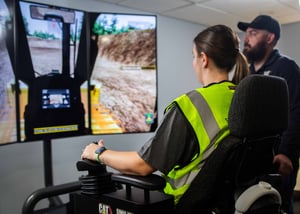Royal Air Force Shawbury in the U.K. is the home of the Defence Helicopter Flying School (DHFS). At DHFS, trainee helicopter pilots from the Royal Navy, Royal Air Force and the British Army obtain rotary training using the HT2 Squirrel helicopter.
CONTEXT: A LONG-TERM RELATIONSHIP
Originally, RC Simulations Ltd, of Yate, U.K., were awarded the contract to produce two part-task trainers (PTTs) to emulate the Shawbury Squirrels.
To achieve this, Robert Sidwick, CEO of RC Simulations and project manager, gave the simulator superior graphics and refined its gaming seat to reflect the Squirrel’s movement.
When it was time to match the aircraft’s engine vibration, Sidwick went straight to D-BOX.
-- Robert Sidwick, CEO of RC Simulations
Sidwick has worked successfully with D-BOX before, using the company’s high-fidelity motion systems for other projects. He knows that D-BOX’s systems are interoperable, so they easily integrate with other companies’ APIs.
CHALLENGE: ADDRESSING TRAINING TRANSFER OF CRUCIAL SKILLS
PTTs are different from full flight simulators; they are designed to teach specific skills such as instrument flight practice. They can also demonstrate what happens if the helicopter enters what is known as a “vortex ring” state. This occurs when a helicopter stalls at very low air speeds, when a significant rate of descent develops. Once in this state, attempts to recover by raising the collective lever lead to even greater rates of descent. Being able to train for these scenarios efficiently and realistically is crucial.
Flight Lieutenant Genevieve Rolleston-Smith, a student pilot at the Defence Helicopter Flying School, RAF Shawbury. embarked on her pre-solo flight check in the Squirrel Part Task Trainer (PTT) simulator. – Photo courtesy of RAF Shawbury – Photo : Ian Forshaw UK MOD Crown Copyright 2015
SOLUTION: D-BOX’S MOTION CUEING SYSTEM
The simulator’s vortex ring descent is accompanied by ever-increasing buffeting, which is provided by D-BOX’s motion-cueing system. Conversely, a main gear box failure features vibration.
D-BOX actuators are used to create the area for pilot seats and controls. On top of the training mission-specific effect, motion-cueing replicates all rotorcraft dynamics behaviours including terrain-handling effects, landing bumps as well as pitch, roll and heave movements.
“The D-BOX integration has been both safe and effective”
Robert Sidwick, CEO of RC Simulations
The original PTTs featured custom scenery and helicopter modelling based on Microsoft ESP (Flight Simulator X). In the beginning of 2016, these PTTs were upgraded to the Lockheed Martin’s Prepar3D 3.2 flight simulation platform. D-BOX has supported this project by providing custom motion code and making the software evolution painless.
RESULTS: SAFE & EFFECTIVE TRAINING
Since 2010, the Tri-Service helicopter training base at RAF Shawbury in England has been using 2 Squirrel Helicopter Part Task Synthetic Trainers fitted with D-BOX motion platforms.
Squadron Leader Bob Northway RAF, the officer in charge of training policy at Shawbury, said that “The D-BOX motion adds an important dimension to the realism of training sorties.”
“At D-BOX, we are very proud to support the evolution of this project, which was one of our first when it started in 2010 in the flight simulation world. It allowed us to learn a lot about the motion cues expected from pilots, and refine our motion codes based on the return of experience from pilot trainees and their instructors,” explained Yannick Gemme, Vice President of Sales, Training and Simulation, at D-BOX Technologies Inc.

